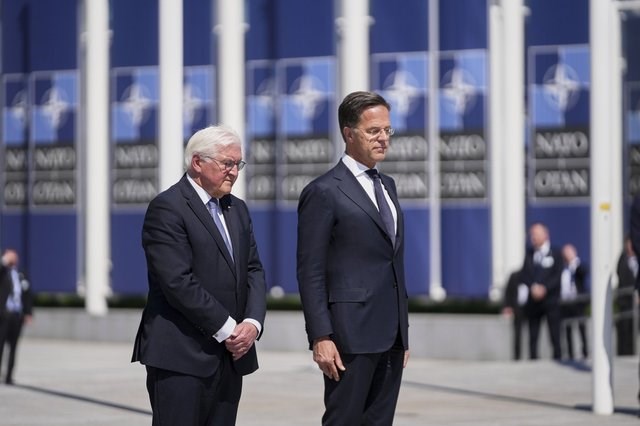
Germany's President Frank-Walter Steinmeier, left, and NATO Secretary General Mark Rutte, right, participate in a wreath laying ceremony to mark the 70th anniversary of Germany's accession to NATO at NATO headquarters in Brussels, Monday, April 28, 2025. (AP Photo/Virginia Mayo)
April 28, 2025 - 6:56 AM
BRUSSELS (AP) — Germany will step up to the new security demands in Europe, President Frank-Walter Steinmeier vowed on Monday, as his country marked 70 years of NATO membership against the background of the Trump administration signaling that U.S. priorities lie elsewhere.
“Today, with (Russian President Vladimir) Putin’s war against Ukraine raging on in full force and with the United States putting fierce pressure on its European allies, Germany, I think, is in a crucial position,” Steinmeier said.
“Germany is being called on, and we heard the call. We got the message and indeed, Mark, you can count on us," he said, standing alongside NATO Secretary-General Mark Rutte at the 32-nation military alliance’s Brussels headquarters.
At the same place in February, U.S. Defense Secretary Pete Hegseth told Ukraine ’s Western backers – most of them NATO members – “that stark strategic realities prevent the United States of America from being primarily focused on the security of Europe.”
Apart from the security challenges the U.S. believes are posed by China, Hegseth said that America would also be “focusing on the security of our own borders.”
His remarks – the first by a member of the new Trump administration at NATO – unsettled Germany and other allies, and many want to know how many U.S. troops might be pulled out of Europe and when so they can fill any security vacuum.
No U.S. withdrawal plans have officially been announced.
Hegseth also added a warning that Ukraine will not get all its territory back from Russia and will not be allowed to join their security organization, which would provide Kyiv with the ultimate security guarantee to ensure that Putin never attacks again.
NATO leaders have always insisted that membership should be discussed solely among allies and candidates and that Moscow can have no say, but recently it’s become a bargaining chip in talks between the United States, Russia and Ukraine.
NATO was formed in 1949 as a bulwark against aggression in Europe by the Soviet Union. Former West Germany sought protection as its 15th member on May 6, 1955, as concern grew about the Soviet army massed east of the iron curtain.
Seventy years on, the threat from Moscow persists and Germany’s incoming coalition has ambitious plans to loosen strict debt rules for higher defense spending to help strengthen the country’s long-neglected military.
The outgoing government created a special 100-billion euro ($114 billion) fund to modernize it, helping Berlin also to meet NATO’s target of spending 2% of GDP, which is likely to be set at 3% or more when the organization’s leaders meet in the Netherlands in June.
“We will strive to make Germany, both its military and its infrastructure, the backbone of conventional defense in Europe,” Steinmeier said.
Speaking inside the cavernous atrium that leads to NATO’s meeting halls and national offices, he praised the allies’ decision to admit West Germany as a member and said he hopes that NATO leaders can show similar “strategic wisdom today, as the path from here on out looks even more uncertain than it looked back then.”
The challenge, Steinmeier said, is to uphold values like democracy and the rule of law as much as to defend territory. “We all know that these have come under attack, not just from outside but also from within,” he said.
News from © The Associated Press, 2025